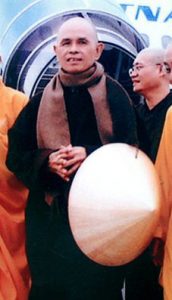
3:17 How does God’s love abide in anyone who has the world’s goods and sees a brother or sister in need and yet refuses help?
3:18 Little children, let us love, not in word or speech, but in truth and action.
3:19 And by this we will know that we are from the truth and will reassure our hearts before him….
Like the Golden Rule, the idea that “loving others” must involve some sort of action shows up in all the world’s religious traditions.

Nat’l. Mus. of Amer. Jewish History
[Wikimedia/Wmpearl (public domain)]
The Jewish tradition holds the concept of tzedakah in high regard. While often translated as “charity,” the Hebrew root actually means righteousness, justice, or fairness. Moreover, tzedakah is a religious obligation. One take on tzedakah is that our property/money/wealth is not actually ours; it belongs to God who has given it to us, so we can use it properly. As you might imagine, there are numerous passages in the Hebrew Bible/Old Testament that address “putting love into action.” Here’s one from Deuteronomy.
Deuteronomy 15:7-8; 10-11 (NRSV translation)
If there is among you anyone in need, a member of your community in any of your towns within the land that the Lord your God is giving you, do not be hard-hearted or tight-fisted toward your needy neighbor. You should rather open your hand, willingly lending enough to meet the need, whatever it may be….Give liberally and be ungrudging when you do so, for on this account the Lord your God will bless you in all your work and in all that you undertake. Since there will never cease to be some in need on the earth, I therefore command you, “Open your hand to the poor and needy neighbor in your land.”
Islam (Zakat)
A similar concept, known as zakat, exists in the Islamic tradition. The Arabic root means “that which purifies,” so there is some connotation with purifying one’s income/wealth from the worldly aspects of acquiring it. Like Jews, however, many Muslims view wealth as something that belongs to God/Allah, who offers it to us in trust. Zakat, as one of the five pillars of Islam, is obligatory for observant Muslims. The word “zakat” appears several times in the Qur’an, but like tzedakah, zakat is about more than just giving money. It’s also about our obligations to all those in need. One of my favorite Qur’anic passages about this is contained in chapter 107. (It’s a short chapter!)
Qur’an, Surah 107 (The Small Kindness — from the Michael Sells translation, found in Approaching the Qur’an: The Early Revelations, White Cloud Press, 1999)
In the Name of God the Compassionate the Caring
Do you see him who calls the reckoning a lie?
He is the one who casts the orphan away
who fails to urge the feeding of one in need
Cursed are those who perform the prayer
unmindful of how they pray
who make of themselves a display
but hold back the small kindness.
Buddhism
Of course, the idea of caring for those in need is not just an Abrahamic principle. The Buddhist tradition also encourages reducing the suffering of others. Applying this idea to social, political, economic and environmental injustices has been particularly important in Humanistic Buddhism — a Chinese reform movement that began in the early 20th century — and Engaged Buddhism — whose poster child is Thich Nhat Hanh. In both cases, emphasis is placed on integrating everyday life with the insights gained through meditation and dharma teachings. The Dalai Lama is also a fan of engaged Buddhism. Here are a few quotes that are relevant to this relatively new movement in the Buddhist tradition.

From the Fourteenth Dalai Lama (A prayer offered on November 6, 2000)
May I become at all times, both now and forever
A protector for those without protection
A guide for those who have lost their way
A ship for those with oceans to cross
A bridge for those with rivers to cross
A sanctuary for those in danger
A lamp for those without light
A place of refuge for those who lack shelter
And a servant to all in need.

From Thich Nhat Hanh (from Peace Is Every Step, Bantam, 1992)
“We will not just say, ‘I love him very much,’ but instead, ‘I will do something so that he will suffer less.’ The mind of compassion is truly present when it is effective in removing another person’s suffering.”
And since it is also Earth day, this Sunday, I will add this quote, from Thich Nhat Hanh, as well.
“You carry Mother Earth within you. She is not outside of you. Mother Earth is not just your environment. In that insight of inter-being, it is possible to have real communication with the Earth, which is the highest form of prayer.”
Multifaith Mashup provides passages from the writings/sacred texts of other faith traditions that match an excerpt from the Biblical lections offered in the Revised Common Lectionary. Multifaith Mashup is published on Tuesdays and focuses on the lectionary readings for the upcoming Sunday. Questions? Contact us at vicki@worldreligions4kids.com.